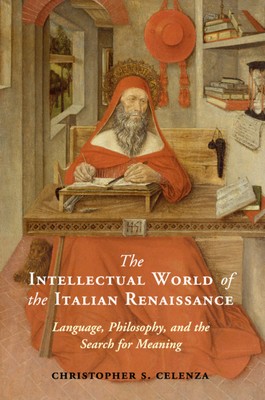
- We will send in 10–14 business days.
- Author: Christopher S Celenza
- Publisher: Cambridge University Press
- ISBN-10: 052117712X
- ISBN-13: 9780521177122
- Format: 15.2 x 22.9 x 2.6 cm, softcover
- Language: English
- SAVE -10% with code: EXTRA
The Intellectual World of the Italian Renaissance (e-book) (used book) | bookbook.eu
Reviews
Description
In this book, Christopher Celenza provides an intellectual history of the Italian Renaissance during the long fifteenth century, from c.1350-1525. His book fills a bibliographic gap between Petrarch and Machiavelli and offers clear case studies of contemporary luminaries, including Leonardo Bruni, Poggio Bracciolini, Lorenzo Valla, Marsilio Ficino, Angelo Poliziano, and Pietro Bembo. Integrating sources in Italian and Latin, Celenza focuses on the linked issues of language and philosophy. He also examines the conditions in which Renaissance intellectuals operated in an era before the invention of printing, analyzing reading strategies and showing how texts were consulted, and how new ideas were generated as a result of conversations, both oral and epistolary. The result is a volume that offers a new view on both the history of philosophy and Italian Renaissance intellectual life. It will serve as a key resource for students and scholars of early modern Italian humanism and culture.
EXTRA 10 % discount with code: EXTRA
The promotion ends in 16d.20:50:24
The discount code is valid when purchasing from 10 €. Discounts do not stack.
- Author: Christopher S Celenza
- Publisher: Cambridge University Press
- ISBN-10: 052117712X
- ISBN-13: 9780521177122
- Format: 15.2 x 22.9 x 2.6 cm, softcover
- Language: English English
In this book, Christopher Celenza provides an intellectual history of the Italian Renaissance during the long fifteenth century, from c.1350-1525. His book fills a bibliographic gap between Petrarch and Machiavelli and offers clear case studies of contemporary luminaries, including Leonardo Bruni, Poggio Bracciolini, Lorenzo Valla, Marsilio Ficino, Angelo Poliziano, and Pietro Bembo. Integrating sources in Italian and Latin, Celenza focuses on the linked issues of language and philosophy. He also examines the conditions in which Renaissance intellectuals operated in an era before the invention of printing, analyzing reading strategies and showing how texts were consulted, and how new ideas were generated as a result of conversations, both oral and epistolary. The result is a volume that offers a new view on both the history of philosophy and Italian Renaissance intellectual life. It will serve as a key resource for students and scholars of early modern Italian humanism and culture.


Reviews